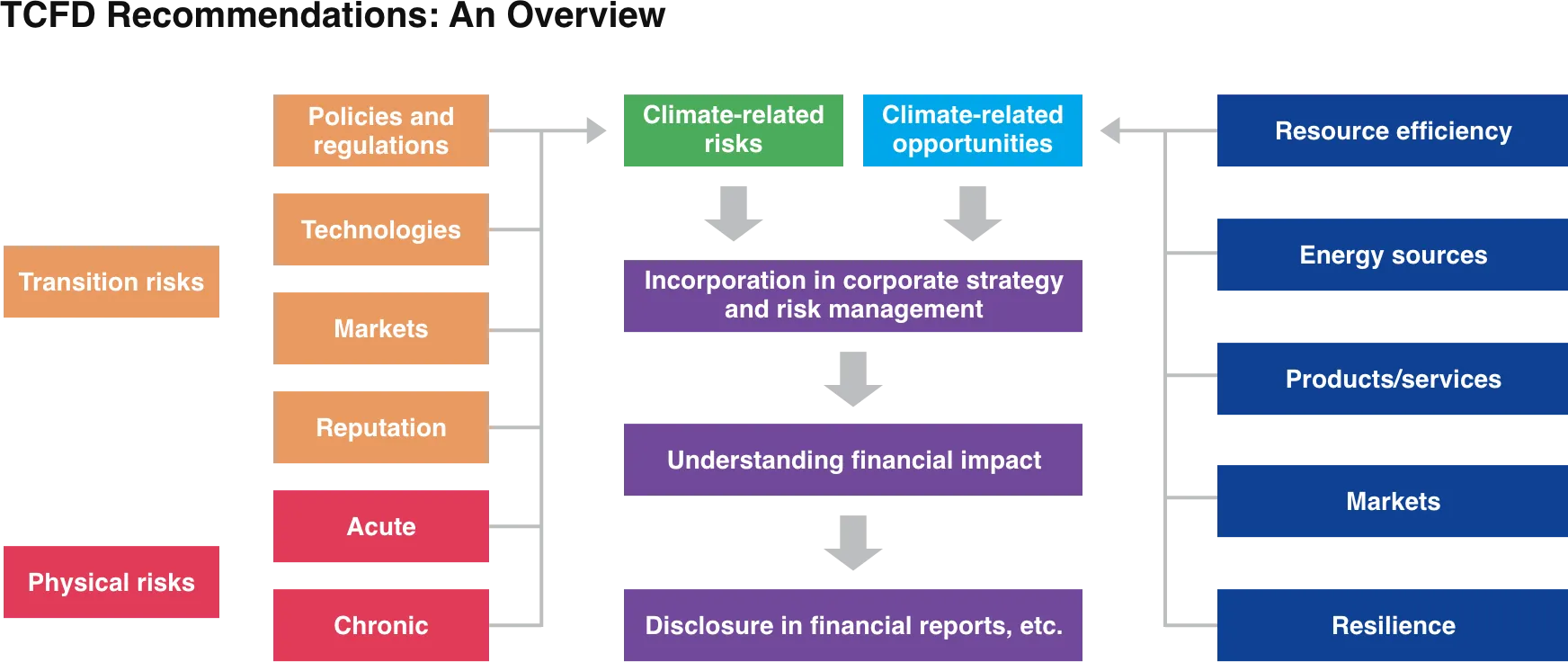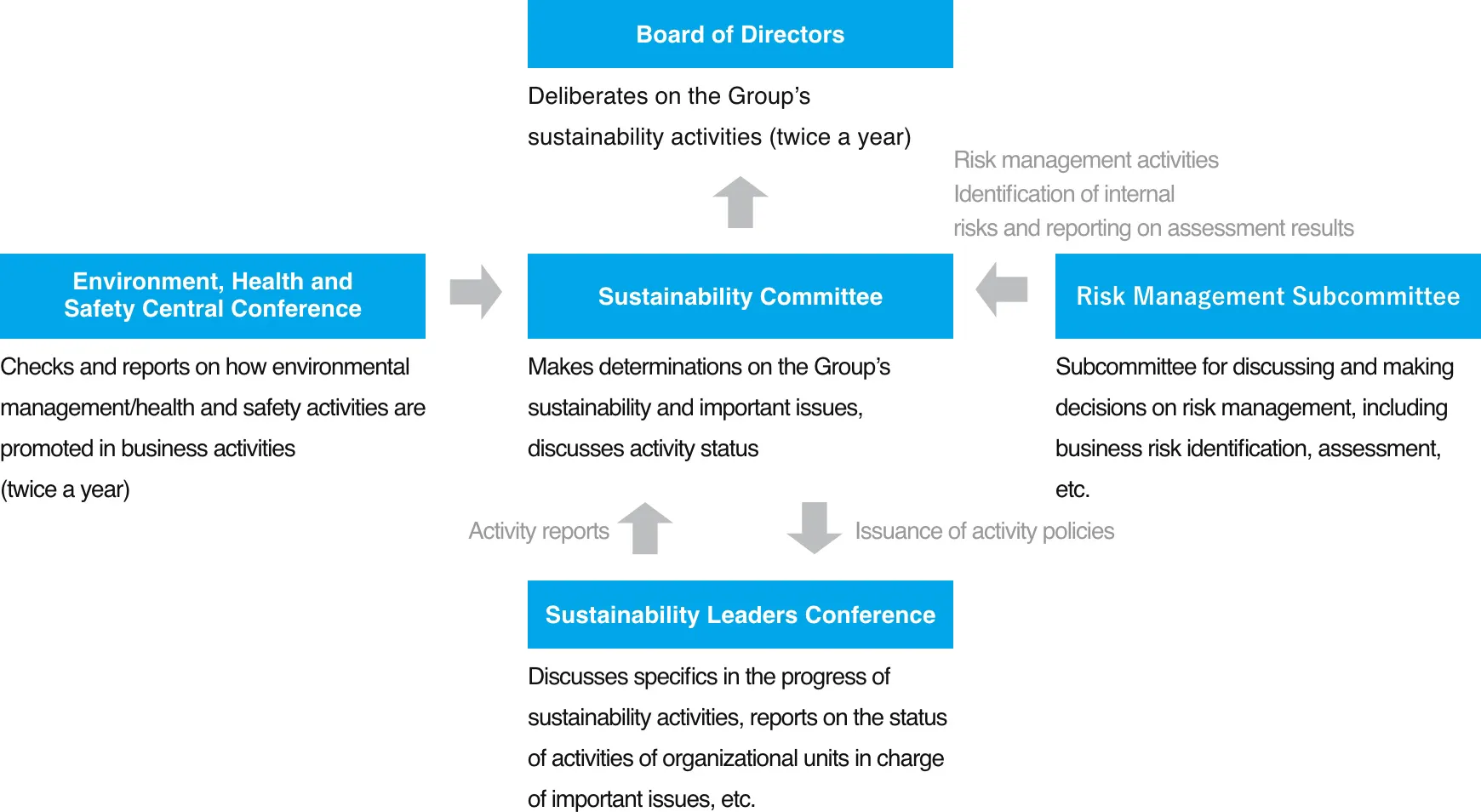SUSTAINABILITY
Climate Change-related Disclosure in Accord with the TCFD
The effects of climate change are becoming increasingly severe each year, resulting in significant impact on the environment, society and corporate activities.
The Task Force on Climate-related Financial Disclosures (TCFD) was established in 2015 by the Financial Stability Board at the request of the G20 to recommend guidelines for disclosure on the financial impact of climate change on companies in order to facilitate a smooth transition to a low-carbon society and stabilize financial markets. Many companies and institutions around the world have already declared their support for the TCFD.
Going forward, in line with the processes presented by the TCFD (see the diagram below), we will continue examinations focused on the risks and opportunities with respect to the Group that are driven by the impact of climate change and the corresponding changes in policies, regulations and markets, as well as technological innovations, in the interest of a low-carbon society and decarbonized society envisioned in the Paris Agreement.

Policy for Global Warming Mitigation Measures
We believe that climate change, which has a significant impact on the earth (i.e., its ecosystems) and corporate activities, poses both risks and new business opportunities for the EKK Group. The transition to a low-carbon society is a key management issue that must be addressed and taken on in order for the Group to achieve sustainable growth.
Our goal is to contribute to the achievement of the international goals set forth in the SDGs and the Paris Agreement (including the 2°C target) by providing industries with product lines centered on the seal technologies cultivated by our Group. We will continue to work alongside our Group companies toward this goal through collaboration with a wide range of stakeholders, including governments, companies and industry organizations.
Governance
Recognizing that climate change is an important matter influencing management, the EKK Group has established the Sustainability Committee under the Board of Directors, which deliberates on climate change and reports its findings to the Board of Directors, creating a system ensuring appropriate supervision by the Board.
The Sustainability Committee is not only responsible for climate change; it also organizes, makes decisions and conducts evaluation and management with regard to other important issues (materiality) for the sustainable growth of the Group, and reports the results of these activities to the Board of Directors. In addition, the Environment, Health and Safety Central Conference checks and reports on how environmental management activities and health and safety activities are being promoted in business activities.

Strategy (Scenario Analysis to Examine Risks and Opportunities)
As a first step toward achieving the goal of the Paris Agreement (to limit the temperature increase to below 2°C by the end of the 21st century) in alignment with the TCFD recommendations, the EKK Group has identified climate-related risks and opportunities based on two scenarios: the “below 2°C scenario,” with accelerated technological innovation on greenhouse gas (GHG) reductions and tightened emission regulations by governments, and the “4°C scenario,” in which these initiatives remain at their current levels.
Under the “below 2°C scenario,” the risks associated with the transition to a decarbonized society are expected to include higher carbon prices due to more stringent environmental taxation and GHG emission regulations from various countries’ environmental policies taken to curb global warming, as well as lower sales of our existing products in the automobile industry due to a decline in the number of internal combustion engine vehicles. As for opportunities, we expect to expand sales of products that utilize our proprietary technologies and for our technologies to contribute as the world more widely adopts technologies reducing GHG emissions and curbing temperature increases.
On the other hand, under the “4°C scenario,” damage to production facilities and interruption of business activities due to increased natural disasters associated with global warming will pose greater threats from physical risks. With respect to these threats, products and technologies protecting social infrastructure by enhancing resilience against extreme weather events are expected to make greater contributions.
In our medium- to long-term business roadmap, we will accelerate expanding our ratio of renewable energy use and reducing CO2 in our production processes toward a decarbonized society. Furthermore, we will expand sales of environmentally friendly products targeting the next-generation mobility and next-generation energy markets, which we have been promoting for some time. In addition, we see our response to the risks posed by climate change in our business activities as an opportunity to generate significant business through the creation of new technologies, and we will continue our efforts to enhance our corporate value over the medium- to long-term.
| Scenario | Future state | Risks | Opportunities |
|---|---|---|---|
| Below 2°C scenario |
|
|
Sales expand for environmentally friendly products targeting the next-generation mobility and next-generation energy markets |
| 4°C scenario |
|
|
|
Risk Management
The EKK Group recognizes that the assessment and management of the risks and opportunities posed by climate change are issues influencing our business activities. With this in mind, the Group has established the Sustainability Committee under the Board of Directors, which deliberates on climate change and reports its findings to the Board of Directors, creating a system ensuring appropriate supervision by the Board.
In FY2022, the existing Risk Management/Compliance Committee will be integrated into the Sustainability Committee, from which point the committee will also take a risk management perspective in identifying risks associated with climate change in our business activities, working to ensure that climate change initiatives permeate throughout the entire Group.
Indicators and Targets
Eagle Industry aims to achieve carbon neutrality by 2050.
As a global company, we consider the realization of a decarbonized society to be an important issue, and we aim to reduce CO2 emissions by 50% in Japan and 30% overseas by 2030 compared to 2018 by developing environmentally friendly products that save energy and reduce environmental impact, and by introducing renewable energy and promoting energy conservation in our production.
The results of these activities will be reported as environmental data in our corporate report.
|
CO2 Reduction Targets |
2030 Target |
2050 Target |
|---|---|---|
|
In Japan |
Compared to FY2018 |
Achieve carbon neutrality |
|
Overseas |
Compared to FY2018 |













